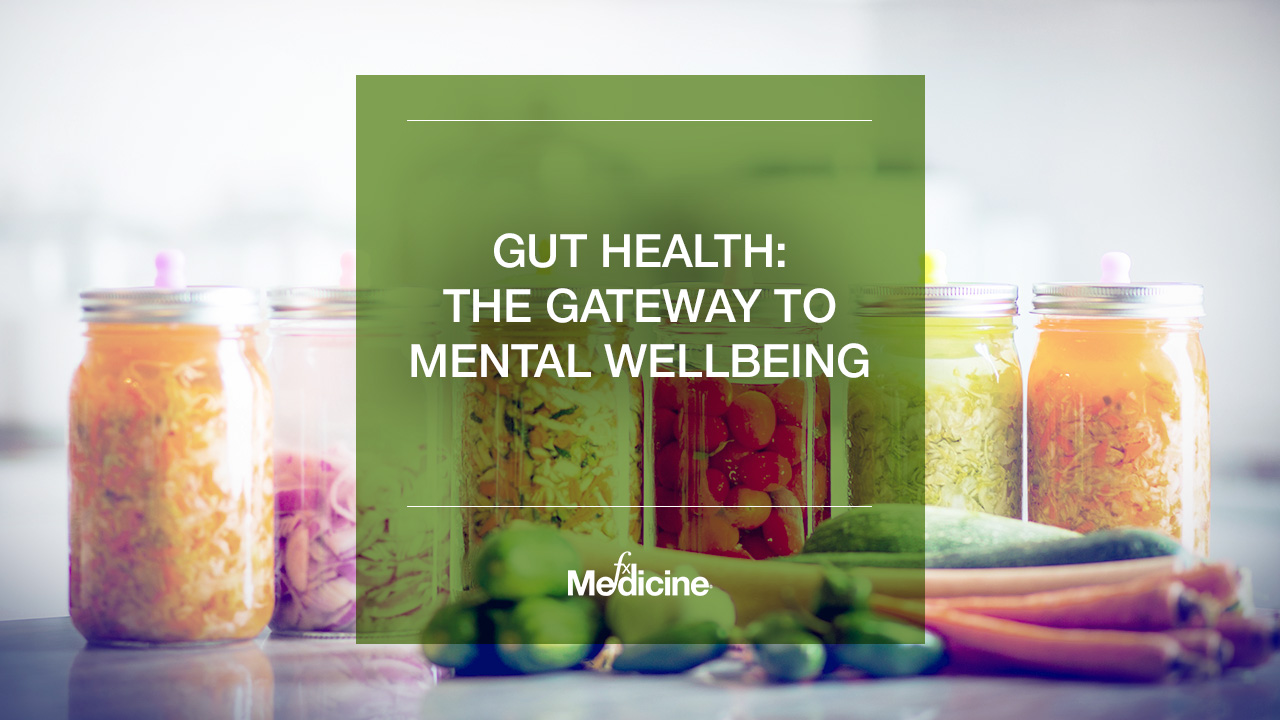Approximately 10.7% of the global population is affected by some form of mental health disorder.[1] In addition, research shows that gastrointestinal comorbidities are also common.[2] This is further supported by clinical evidence outlining the existence of a complex bidirectional communication network – the gut-brain axis – and the fundamental role it plays in maintaining digestive and mental health.[2,3]
Poor nutrition is a common concern for patients with mental health conditions and plays a crucial role in onset, severity and duration of symptoms.[4,5] Dietary interventions with supportive supplementation have demonstrated significant symptom improvement, making them key treatment approaches for consideration.[6,7]
The impact of diet
A westernised diet rich in sugar, salt, and fat can increase the permeability of the gut lining. As a consequence, gut dysbiosis, HPA axis dysfunction and intestinal inflammation often occur.[2,3] The lack of nutrients, coupled with poor absorption in the inflamed intestinal lining caused by the typical western diet, also affects neurotransmitter production and function, which negatively affects behaviour and mood.[8]
In contrast, the consumption of a Mediterranean style diet rich in plant based foods, fermented foods, prebiotics and probiotic supplementation is anti-inflammatory, as well as particularly beneficial for, and protective of, the health of the gut microbiome and brain.[9]
Fermented foods, prebiotics and probiotics
Fermented foods are known largely for their digestive benefits due to the plethora of probiotic bacteria they contain. However, it’s also suggested that their ability to enhance the digestibility and bioavailability of nutrients – improving nutrient status overall – is associated with a boost in mental health.[3]
Prebiotics – an essential food source for probiotics – are also required, as they encourage the selective growth of beneficial bacteria like those from the Lactobacillus and Bifidobacteria genera.[10] In particular, fructo-oligosaccharides and galacto-oligosaccharides boost the production of short chain fatty acids, leading to reduced intestinal inflammation, improved gut microbial balance, and reduced emotional distress.[10,11] Whilst these prebiotic fibres are present in many foods such as onion, wheat bran and garlic, their effect on mood and behaviour is seen at doses of 5g per day or above – so supplementation, in conjunction with dietary changes, should be considered.[9]
Specific probiotic strains
The use of probiotics to improve mental health outcomes is an emerging field of research. Specifically, studies are focused on a group of probiotics termed ‘psychobiotics’. These are distinct strains or formulations that can positively influence the relationship between the microbiota, the brain and therefore mental health and mood.[9]
To date, clinical trials including a combination of Lactobacillus helveticus R0052 and Bifidobacterium longum R0175 (3x109 colony-forming units) have shown reduced anxiety, depression, anger, and lowered cortisol.[12] In vivo studies showed Bifidobacterium longum 1714 and Lactobacillus rhamnosus (JB-1) had similar effect, however, further trials in humans are needed.[13]
Additionally, strains such as Lactobacillus plantarum, Lactobacillus acidophilus, Bifidobacterium infantis and Saccharomyces boulardii can also confer health benefits. This includes the production of several neurotransmitters, including serotonin, norepinepherine and gamma- amino butyric acid (GABA), and reducing anxiety and depression through having a direct impact on the gut-brain axis.[12]
Mental health disorders are increasingly pervasive worldwide and can have a significant impact on quality of life. A growing body of research supports the use of dietary interventions in the management of these conditions given the fundamental link between the brain and microbiome. Additionally, the application of prebiotic, probiotic and targeted psychobiotic supplementation may provide additional benefits, though further research is needed to identify supportive strains and their effect.
References
- Ritchie, H, Roser, M. Mental Health. Our World in Data, 2018 [Source]
- Aslam H, Green J, Jacka FN, et al. Fermented foods, the gut and mental health: a mechanistic overview with implications for depression and anxiety. Nutritional Neuroscience 2018 [Abstract]
- Selhub, EM, Logan, AC & Bested, AC. Fermented foods, microbiota, and mental health: Ancient practice meets nutritional psychiatry. Journal of Physiological Anthropology 2014;33(1):1–12 [Full Text]
- Firth J, Marx W, Dash S, et al. The Effects of Dietary Improvement on Symptoms of Depression and Anxiety: A Meta-Analysis of Randomized Controlled Trials. Psychosomatic Medicine 2019;81(3):265–280 [Abstract]
- Rao TS, Asha MR, Ramesh BN, et al. Understanding nutrition, depression and mental illnesses. Indian Journal of Psychiatry 2008;50(2):77–82 [Full Text]
- Mcadam TS. Global Trends and Local Choices. Stanford University, 2013. [Source]
- O’Neil A, Quirk SE, Housden S, et al. Relationship between diet and mental health in children and adolescents: A systematic review. American Journal of Public Health 2014;104(10):e31–e42 [Full Text]
- Linus Pauling Institute 2011. Cognitive Function In Depth, Micronutrient Information Center, 2020. [Source]
- Taylor AM, Holscher HD. A review of dietary and microbial connections to depression, anxiety, and stress. Nutritional Neuroscience 2020;23(3):237–250 [Abstract]
- Kim Y-K, Shin C. The Microbiota-Gut-Brain Axis in Neuropsychiatric Disorders: Pathophysiological Mechanisms and Novel Treatments. Current Neuropharmacology 2018;16(5):559–573 [Full Text]
- Flux MC, Lowry CA. Finding intestinal fortitude: Integrating the microbiome into a holistic view of depression mechanisms, treatment, and resilience. Neurobiology of Disease 2020;135(104578):1–36 [Full Text]
- Misra S, Mohanty D. Psychobiotics: A new approach for treating mental illness? Critical Reviews in Food Science and Nutrition 2019;59(8):1230–1236 [Abstract]
- Cheng LH, Liu YW, Wu CC, et al. Psychobiotics in mental health, neurodegenerative and neurodevelopmental disorders. Journal of Food and Drug Analysis 2019;27(3):632–648 [Full Text]
DISCLAIMER:
The information provided on FX Medicine is for educational and informational purposes only. The information provided on this site is not, nor is it intended to be, a substitute for professional advice or care. Please seek the advice of a qualified health care professional in the event something you have read here raises questions or concerns regarding your health.



